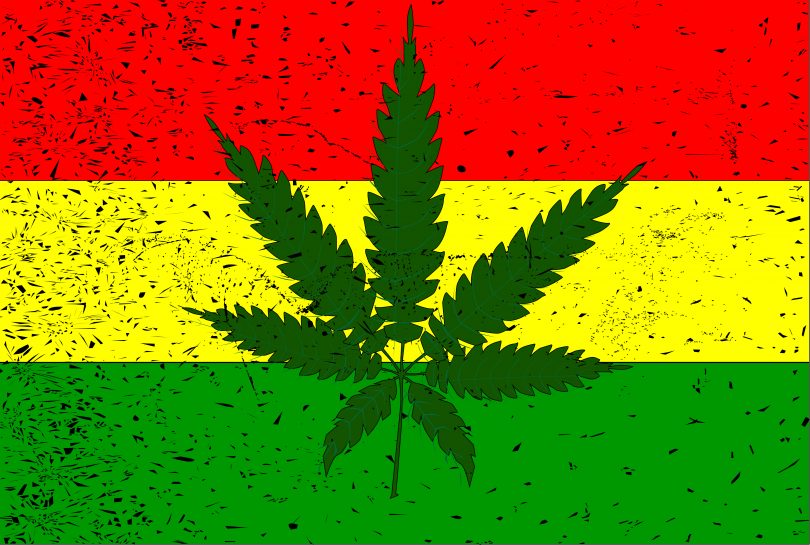Throughout history, cannabis has established itself as a popular recreational tool and powerful medicine, used in these ways worldwide according to local culture. For the Rastafari, though, it’s also a part of their religious tradition. As cannabis laws are reassessed globally, the push for religious freedom has helped loosen regulation for the Caribbean communities.
The Rastafarian traditions aren’t actually about big dreads, singing reggae, and Bob Marley smoking a cannabis joint on the cover of a magazine. Although, as Rastafarianism’s biggest star, Bob Marley’s peaceful attitude and timeless music have sure gone a long way to promote the cause. The Rastafari tradition was born from Jamaican national hero, Marcus Garvey, who spoke of a new king coming forth in Africa.
When Ras Tafari Makonnen (better known to many as Haile Selassie) was crowned the king of Ethiopia in 1930, it seemed a fulfillment to this prophesy. Those who followed Garvey and had taken his words as a prophesy, named themselves as a movement in the name of the new ruler, using his given name Ras Tafari.
While early Rastafarianism was more controversial, it morphed over time into a peaceful movement with its own interpretations of the bible. For them, the promised land is Zion, which is Ethiopia, where mankind was born, or just as a spiritual concept. Their god is Jah, and the ‘tree of life’ is seen as a representation of the cannabis plant. Contrary to popular belief, Rastas generally frown on using weed to get high, and use it themselves only as part of religious rituals to promote oneness and spirituality.
When cannabis was illegalized all over the world in the 1900’s, the Caribbean Islands were no exception, and the plant that had come to symbolize religious belief and ritual for so many, was made illegal. This continued on for some time, and only recently, as much of the world changes tone with cannabis regulation, have laws been changing in this sector of the world as well, pushed forward by the Rastafarian movement and the desire for religious freedom.
Use the sign-up form below to subscribe to the CBD Flowers Weekly Newsletter
How have things been changing?
Jamaica
The desire to change legislation was building for some time. Jamaica was the first in the region to make big changes in 2015, by decriminalizing personal use amounts of up to two ounces, allowing home cultivation of up to five plants, and establishing a medical cannabis program. This came about because of reforms to the Jamaican Constitution in 2011 that included a new act called the Charter of Fundamental Rights and Freedoms.
This was more powerful than the Dangerous Drugs Act which had been the legal basis for illegalizing cannabis. When the new law passed in 2015, it also included a provision that exempts possession of cannabis for religious purposes for the Rastafarian religion. Along with this, cannabis can be grown for religious purposes with permission from the Justice Minister, who must be satisfied that the applicants are indeed Rastafarians. This exemption also goes for events of celebration in the faith.
Barbados
In 2019, Barbados passed the Medical Cannabis Industry Bill that paves the way for legal medical cannabis, as well as provisions for those in the Rastafarian sect to be able to practice their religious rituals in peace, according to Attorney General Dale Marshall.
He went on to say: “I have taken to Cabinet and I have got Cabinet’s approval for the preparation of a bill to bring to this chamber which will facilitate the use by members of the Rastafarian faith of cannabis for the purpose of their religion… For us to continue to prohibit that, would be to continue to breach their fundamental constitutional rights. And not just rights guaranteed by the Barbados Constitution, but rights guaranteed by the International Covenant on Civil and Political Rights.”
The new laws come with provisions that must be met in order for Rastafarians to use cannabis legally for their religious practices. Nonetheless, the country of Barbados now accepts cannabis use as a part of the Rastafarian religion and concedes that limiting the ability of Rastas to practice their religion as they please, is an infringement on religious rights.
Barbados Poised To Legalize Medical Cannabis
Bahamas
Though legislation has not changed yet in the Bahamas, the Bahamas National Commission on Marijuana released recommendations for decriminalization, medical use, and religious use. The Commission recommended developing a Rastafari council that could regulate use within the community.
Saint Lucia
Not every sect of the Rastafarian movement is happy to be patient about cannabis changes. Take Saint Lucia, where the Rastafarian community threatened to sue the government citing violations to the constitutional and human rights of the members of the group. The The Iyanola Council for the Advancement of Rastafari (ICAR) claims that their freedom of religion is protected by the United Nations Declaration of Human Rights. ICAR leader Aaron Alexander had said he would take the government to court if it did not recommend legalization after reports from the Saint Lucia Cannabis Commission were submit.
A new Cannabis Commission was created in November 2019. The commission will aid the government in developing a framework for the legislative and regulatory changes for allowing restricted cannabis use.
And the other advantages….
These days, reassessing your country’s weed laws is the new thing to do, and wild changes have been made across the board, particularly in places like Africa where countries like Lesotho, Zimbabwe, and Zambia have quickly updated their legislation in order to take advantage of the new and booming weed economy.
One of the commonalities of the African changeover is that every country thus far in that region to update their cannabis policy, did so with an emphasis on legalizing cultivation for medicinal cannabis, and the exportation of it. While many of the Caribbean communities push to legalize cannabis so they can practice their religion as they see fit, others seem to have their eye on the economic aspect.
Hemp Market Growth Predictions: $26.6 Billion By 2025
The US Virgin Islands just decriminalized personal use amounts and medical cannabis in their Medical Cannabis Patient Care Act, with specific legislation to allow people from outside to come to the Virgin Islands to receive treatment. Governor Albert Bryan Jr is now pushing for an amendment to legalize cannabis on the entire island and allow free smoking therein. Instead of calling it ‘recreational’ cannabis, they call it ‘non-prescribed’ cannabis. With this legislation there is hope for turning the Virgin Islands into a medical cannabis tourism hotspot geared toward Americans and Europeans.
In 2017 Bermuda decriminalized personal use of up to seven grams. More recently, it released a blueprint for the establishment of a domestic medical cannabis industry. As Attorney General Kathy Simmons says, it will create new business opportunities for locals, while also attracting foreign investment. Simmons went on to say, “This government is not only expecting to attract international investment under this new scheme, it is designed so that entry into the marketplace is also accessible to local enterprises and startups.” A look at licensing fees when they are decided (and how they correspond to locals’ finances) should give better insight into how truthful her statement is.
Antigua and Barbadu decriminalized personal possession and personal cultivation, and are looking to set up a regulatory system for medical and religious cannabis production.
Conclusion
Many things can instigate change in legislation. General changes in society and popular opinion, socioeconomic issues within a country, emerging industries becoming available, and the need for change due to religious and personal freedoms.
And while Rastas in Jamaica might not care about how much money the government of the Virgin Islands hopes to make by legalizing cannabis completely and setting up an oasis for tourists to come smoke in, both parties are after the same thing in the end… the ability to use cannabis freely, whether for medical use, recreational good times, or for religious purposes. And while the Caribbean region would likely have begun updating its cannabis laws regardless, as its quite a trend these days, it has been pushed along faster, no doubt, by grievances of religious repression, and desires for religious freedom.
Thank you for stopping by CBDtesters.co. We’re happy to keep you up-to-date on everything in the world of weed. Come back frequently and make sure to subscribe to the CBD Flowers Weekly Newsletter to get all the important industry news.







